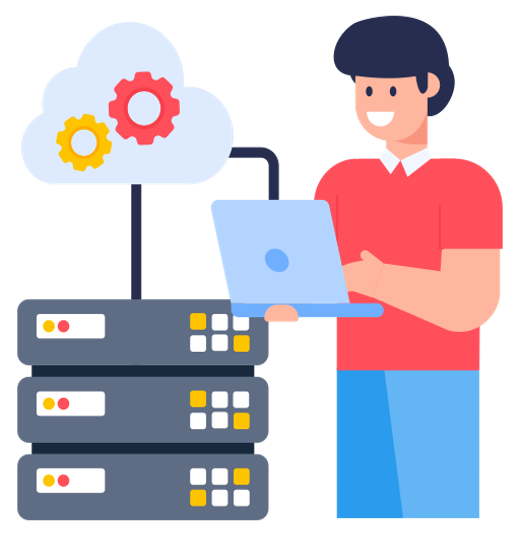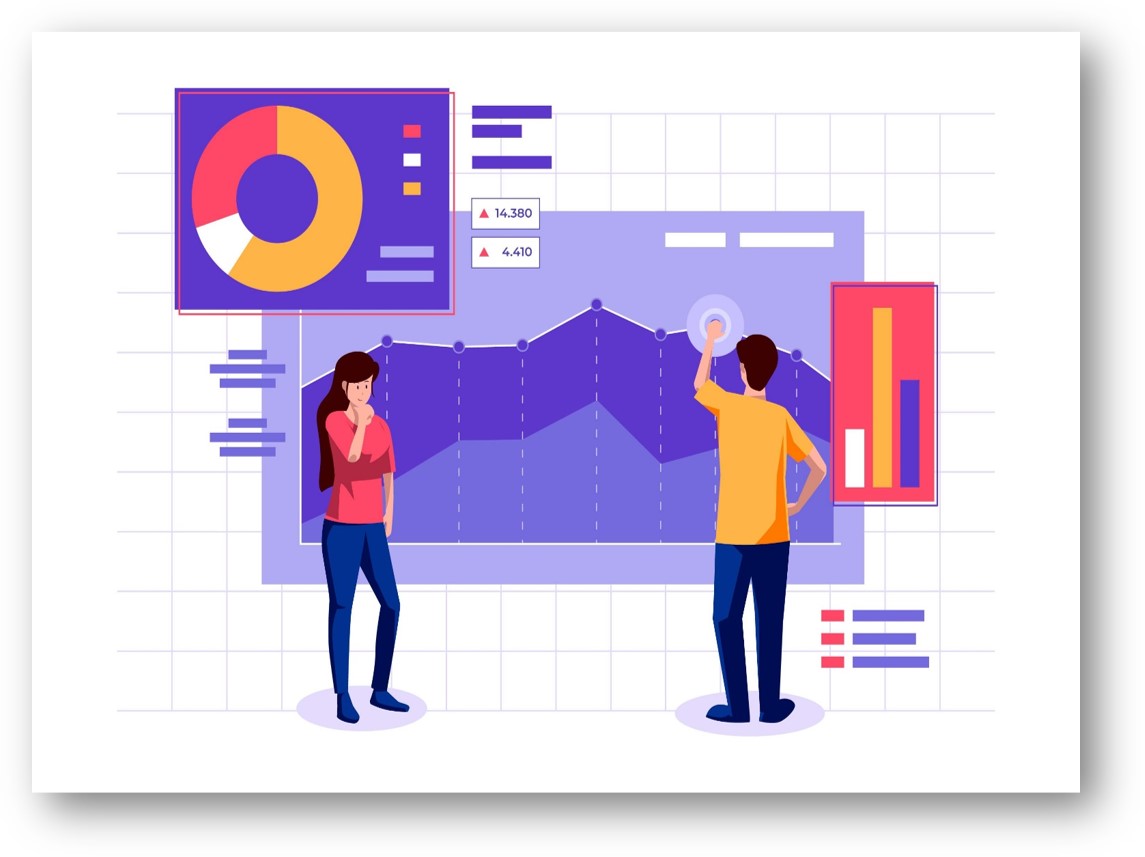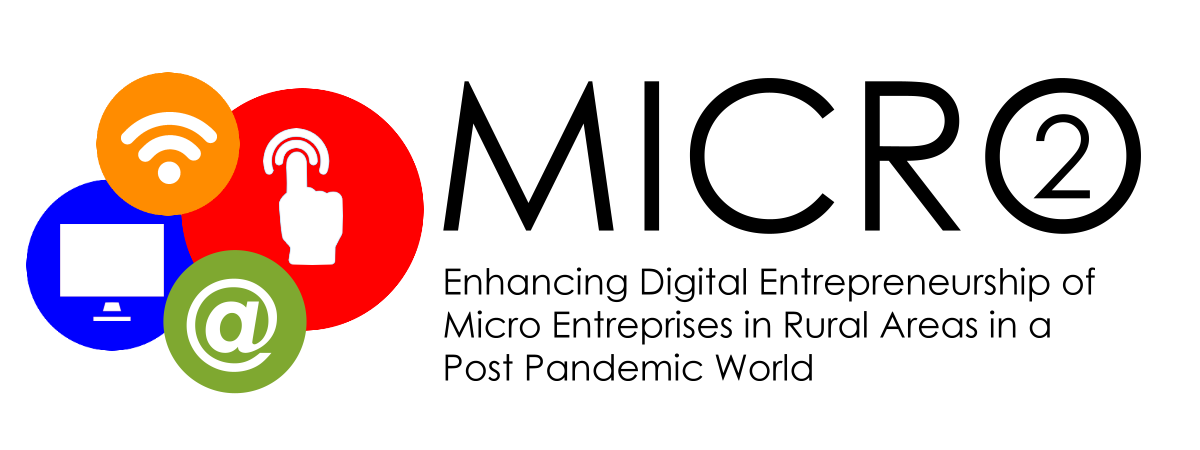 Data management principles in Rural microenterprises Data management principles in Rural microenterprises
 Introduction: The importance of data management for rural MSMEs Introduction: The importance of data management for rural MSMEs
Data management is crucial for enhancing business competitiveness in rural microenterprises in the post-COVID era as effective data management provides access to accurate and timely information, enabling microenterprises to make well-informed decisions.
Moreover, data-driven decision-making can lead to better resource allocation, optimized operations, and strategic planning, ultimately enhancing the overall competitiveness of the business.
Data analysis allows rural microenterprises to identify emerging market trends, customer preferences, and changing demands. Understanding market dynamics helps them adapt their products and services to meet customer needs effectively, giving them a competitive edge over rivals.
In this sense, data management allows rural microenterprises to spot growth opportunities and potential niches in the market. It enables them to seize new opportunities quickly and diversify their offerings, which can lead to business expansion and increased competitiveness. On the other hand, it can help microenterprises streamline their operations, identify inefficiencies, and implement process improvements. This leads to increased productivity, reduced costs, and higher profitability, all of which contribute to competitiveness.
Learning how to effectively manage data contributes to rural MSMEs Digital Transformation as in Post-COVID, the digital landscape has become increasingly important for business success. Effective data management is a fundamental component of digital transformation, allowing microenterprises to leverage digital technologies, optimize workflows, and reach a wider customer base, building resilience in the face of uncertainties, including the lingering effects of the pandemic.
Moreover, in rural areas, microenterprises may face competition from larger companies with more resources. Effective data management levels the playing field by allowing microenterprises to use data-driven strategies and make agile decisions that match or even surpass the competition, contributing to the long-term sustainability by fostering adaptability and innovation. |
 |
 Best practices in data management for rural MSMEs Best practices in data management for rural MSMEs
|
Best practices in data management for rural microenterprises focus on maximizing the value of data while addressing the unique challenges faced in rural settings.
Here are some essential best practices:
Clear Data Management Policies: Establish clear data management policies and procedures tailored to the needs and resources of the rural microenterprise. Clearly define data roles, responsibilities, and governance.
Data Collection Planning: Plan data collection strategically, focusing on relevant and actionable information. Prioritize data that aligns with business goals and customer needs to avoid data overload.
Use of Digital Tools: Embrace user-friendly digital tools and technologies suitable for rural areas to facilitate data collection, storage, and analysis efficiently. (See Section 2.2 of this training)
Data Quality Assurance: Implement data quality checks and validation processes to ensure the accuracy and reliability of data collected.
Secure Data Storage: Safeguard data through secure storage solutions, backup procedures, and access controls to protect against data loss and breaches.
Data Privacy and Compliance: Adhere to data privacy regulations and ethical standards to protect sensitive information and maintain customer trust.
|

|
Data Analysis and Insights: Utilize data analytics tools and techniques to derive meaningful insights from data, informing strategic decision-making.
Capacity Building: Invest in training and capacity building to enhance data literacy among employees and stakeholders to foster a data-driven culture.
Data-Driven Decision Making: Encourage data-driven decision-making at all levels of the microenterprise, empowering employees to use data to improve their daily operations. Promote a data-driven culture within the microenterprise, where decisions are based on data insights and analytics rather than intuition alone.
Continuous Improvement: Continuously review and improve data management practices based on feedback and performance evaluation.
Backup and Disaster Recovery: Establish robust backup and disaster recovery plans to protect against data loss in case of unforeseen events.
Focus on Customer Data: Prioritize the collection and management of customer data to understand preferences and provide personalized experiences.
Data Governance Education: Educate employees and stakeholders about the importance of data governance and the responsible use of data. Establish clear data governance policies and assign ownership of data management tasks to responsible individuals within the organization.
|

|
Data Visualizations: Use data visualizations to present information in a clear and understandable manner, aiding decision-makers.
Data Relevance and Context: Collect and manage data that is directly relevant to the microenterprise's business goals and context. Avoid data overload and focus on capturing information that will inform decision-making.
Data Accessibility: Ensure that relevant stakeholders within the microenterprise have timely access to the data they need to perform their roles effectively.
Adaptability and Flexibility: Be prepared to adapt data management practices to accommodate changes in the business environment or to leverage emerging technologies.
Sustainable Data Management: Develop data management strategies that are sustainable and scalable, considering the long-term needs and growth of the microenterprise.
By adhering to these data management principles and best practices, rural microenterprises can effectively harness the power of data to drive business growth, optimize processes, and make informed decisions, ultimately contributing to their digital and business transformation in the post-COVID era.
|
 How to manage data effectively to enable digital and business transformation of rural MSMEs How to manage data effectively to enable digital and business transformation of rural MSMEs
 Strategic use of data for business competitiveness: Leverage data effectively Strategic use of data for business competitiveness: Leverage data effectively
|
So far, we have reviewed why is data management important for rural MSMEs and what are the best practices that should be applied in data management for rural micro enterprises but how can Rural MSMEs use strategically data to enhance their competitiveness?
Here are some strategic implementations of data-management for business competitiveness in rural MSMEs:
Market Research and Customer Insights: MSMEs can use data to conduct market research and gain insights into customer preferences, needs, and behavior. This information can be used to develop products and services that align with customer demands, giving them a competitive advantage.
Targeted Marketing Campaigns: By analyzing data on customer demographics and behaviors, rural MSMEs can create targeted marketing campaigns that reach the right audience at the right time, leading to higher conversion rates and improved customer acquisition.
Operational Efficiency: Data can help MSMEs optimize their operations by identifying inefficiencies and streamlining processes. This can result in cost savings, improved productivity, and faster response times, enhancing their competitiveness.
Inventory Management: Through data analysis, rural MSMEs can predict demand patterns and manage inventory levels effectively. This ensures they have the right products in stock, reducing carrying costs and preventing stockouts.
Pricing Strategies: Data-driven pricing strategies allow MSMEs to set competitive prices based on market demand, competitor pricing, and customer preferences, ensuring they remain attractive to customers while maximizing profitability.
|

|
Supplier Management: By analyzing supplier data, MSMEs can make informed decisions about their suppliers, negotiate better terms, and build stronger relationships with reliable partners, enhancing their supply chain efficiency.
Customer Service Enhancement: Data analytics can be used to track customer feedback and sentiments, allowing MSMEs to improve their customer service and address issues promptly, leading to higher customer satisfaction and loyalty.
Market Expansion Opportunities: Data analysis can identify potential new markets or niches for MSMEs to enter. By understanding market trends and demands, they can seize opportunities for growth beyond their current reach.
To effectively implement all these strategic usages, it is fundamental for rural MSMEs to properly leverage data browsing, searching, and filtering.
In particular it is important to:
1) Organize data into relevant categories and tags to facilitate easy browsing and searching.
2) Design an intuitive and user-friendly interface that allows users to easily navigate and access the desired data.
3) Implement advanced search features that enable users to perform specific searches based on criteria such as date range, keywords, and other filters.
4) Use data visualization techniques, such as charts and graphs, to present large datasets in a visual format, making it easier for users to identify patterns and trends.
5) Incorporate predictive search functionality that suggests relevant search queries as users type, saving time and improving search accuracy.
|
|
6) Offer filtering options that enable users to narrow down search results based on specific attributes or parameters.
7) Utilize search indexing technologies to improve search speed and efficiency, particularly when dealing with vast amounts of data.
8) Add relevant metadata and tags to each data entry to enhance searchability and provide context to the data.
9): Implement data permissions and access controls to ensure that users only access data relevant to their roles and responsibilities.

Let’s make some clarifying examples of how data management can be implemented in rural micro-SMEs:
Farm Management Data: A rural micro-SME engaged in agriculture might use a mobile app to collect data on crop growth, weather conditions, soil quality, and pest infestations. This data helps them make informed decisions about planting, irrigation, and pest control, ultimately improving crop yield and profitability.
Handicraft Sales Tracking: A rural micro-SME involved in handicrafts might use a spreadsheet to track inventory, sales, and customer preferences. By analyzing sales data, they can identify popular products and adjust their production and marketing strategies accordingly.
Rural Tourism Analytics: A rural micro-SME in the tourism sector might use data from visitor surveys and online reviews to analyze visitor preferences and trends. This information helps them tailor their offerings, improve guest experiences, and attract more tourists.
Local Retail Inventory Management: A rural micro-SME running a local store might use a simple POS system to track inventory levels. When items are sold, the system updates stock levels, ensuring they never run out of popular products while minimizing excess stock.
|

|
Livestock Health Monitoring: A rural micro-SME focused on livestock farming might use sensors and data loggers to monitor the health and well-being of their animals. This data helps detect early signs of illness, allowing for timely veterinary care and preventing potential losses.
Community Healthcare Center Data: A rural micro-SME operating a healthcare center might use electronic health records (EHR) to manage patient data and treatment plans. This digital system improves patient care by enabling quick access to medical history and facilitating data-driven diagnoses.
Local Food Processing Efficiency: A rural micro-SME in the food processing industry might use data to optimize production processes. By analyzing data on production rates, ingredient quality, and energy consumption, they can enhance efficiency and reduce waste.
Craft Brewing Quality Control: A rural micro-SME in the craft brewing industry might use data loggers to monitor temperature and fermentation conditions during the brewing process. This data ensures the consistent quality of their products.
Handloom Weaving Design Optimization: A rural micro-SME involved in handloom weaving might use software to create and manage design patterns. This data-driven approach allows for efficient use of materials and customization based on customer preferences.
Eco-Tourism Booking Analytics: A rural micro-SME in the eco-tourism sector might use a reservation system that collects booking data. By analyzing booking trends and peak seasons, they can offer special packages and optimize resource allocation.
These examples demonstrate how rural micro-SMEs can use data management practices to make informed decisions, enhance operational efficiency, and offer better products and services to their customers. Data management helps these businesses thrive in their unique contexts while contributing to their growth and competitiveness.
Furthermore, by strategically using data and leveraging it effectively through browsing, searching, and filtering mechanisms, rural MSMEs can gain a competitive edge by making data-driven decisions and optimizing their business operations.

|
 Adoption of Digital technologies to enhance data literacy Adoption of Digital technologies to enhance data literacy
|
Adoption of Digital technologies to enhance data literacy
Rural MSMEs can leverage various digital technologies and software to enhance their data management capabilities. These tools are often user-friendly, cost-effective, and suitable for the specific needs of smaller businesses.
Here are some digital technologies and software that can be used by rural MSMEs for effective data management:
Cloud Storage and Backup Solutions: Cloud-based storage services like Google Drive, Dropbox, or Microsoft OneDrive allow MSMEs to securely store and access data from anywhere with an internet connection. They also provide automated backup solutions to protect data against loss.
Data Analytics Tools: Software like Microsoft Excel, Google Sheets, or open-source tools like Apache OpenOffice Calc can be used for basic data analysis, visualization, and reporting. More advanced analytics tools like Tableau or Power BI can also be employed for sophisticated data analysis.
Customer Relationship Management (CRM) Software: CRM platforms like HubSpot, Zoho CRM, Sublime CRM or Salesforce help MSMEs manage customer data, track interactions, and improve customer relationships. CRM systems can assist in personalized marketing and targeted communication.
Inventory Management Software: Inventory management tools such as QuickBooks, Xero, or TradeGecko can help rural MSMEs optimize stock levels, track inventory movement, and manage supply chain operations more efficiently.
Data Collection Mobile Apps: Mobile data collection apps like Formstack, SurveyMonkey, or Google Forms allow MSMEs to collect data on the field using smartphones or tablets, streamlining data collection processes.
Data Security Software: Tools like antivirus software, firewall systems, and encryption software help protect data from security threats and ensure data privacy compliance.
|

|
Enterprise Resource Planning (ERP) Systems: Although more comprehensive and often used by larger businesses, cloud-based ERP systems like Odoo or NetSuite can assist rural MSMEs in integrating data from various departments and streamlining business processes.
Document Management Systems: Document management software like SharePoint or Google Workspace (formerly G Suite) can aid in organizing and managing digital documents, facilitating easy retrieval and collaboration.
Data Visualization Tools: Data visualization platforms like Infogram, Canva, or Datawrapper enable MSMEs to create visually appealing charts and graphs to represent data insights effectively.
Data Integration Platforms: Integration platforms like Zapier or Microsoft Power Automate can help connect and synchronize data between various business applications, reducing manual data entry and data silos.
Point-of-Sale (POS) Systems: For MSMEs involved in retail, a modern POS system with data management features can assist in sales tracking, inventory management, and customer insights.
Collaboration and Communication Tools: Collaboration tools like Slack, Trello, Microsoft Teams, or Zoom facilitate seamless communication and data sharing among team members, particularly when remote work is involved.
MSMEs can choose the tools that align with their specific data management needs and budget constraints. Additionally, they can consider adopting open-source software, which can be cost-effective and customizable to suit their unique requirements. Regular training and capacity building for employees will be essential to ensure effective utilization of these digital technologies for data management.
|
 Summing up Summing up
 Summing up Summing up
|

|
- Data management is crucial for enhancing business competitiveness in rural microenterprises in the post-COVID era as effective data management provides access to accurate and timely information, enabling microenterprises to make well-informed decisions.
- Best practices in data management for rural microenterprises focus on maximizing the value of data while addressing the unique challenges faced in rural settings
|
|

|
- Rural MSMEs can use strategically data to enhance their competitiveness.
- Rural MSMEs can leverage various digital technologies and software to enhance their data management capabilities. These tools are often user-friendly, cost-effective, and suitable for the specific needs of smaller businesses.
|
|
Data Management, Rural Microenterprises, Digital Transformation, Business Transformation, Post-COVID Era, Data Strategies, Data Analytics, Data Collection, Data Sharing, Rural Development, Microenterprise Management, Digital Tools and Technologies, E-commerce Solutions
 Data management principles in Rural microenterprises
Data management principles in Rural microenterprises


 How to manage data effectively to enable digital and business transformation of rural MSMEs
How to manage data effectively to enable digital and business transformation of rural MSMEs


 Summing up
Summing up Test Yourself
Test Yourself








